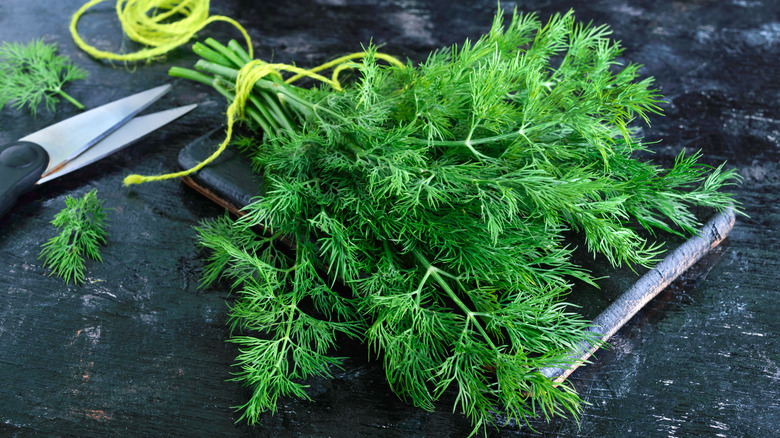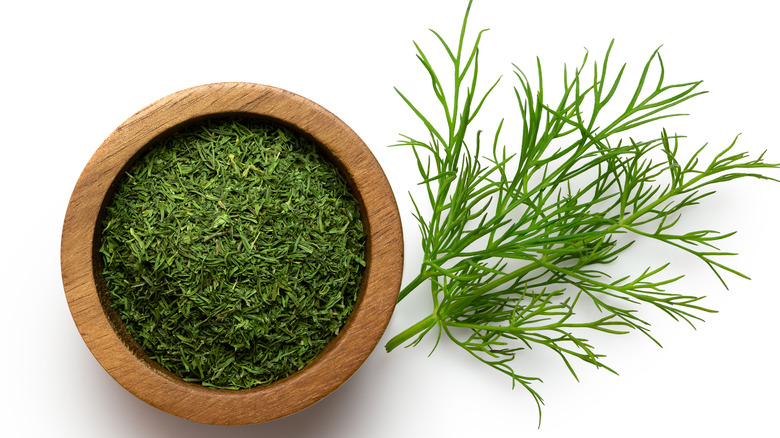How To Store Dill So It Stays Fresher Longer
Dill is a highly aromatic, versatile fresh herb that packs a punch — just a pinch of it instantly adds a pop of brightness to the flavor and color of any dish, whether savory or sweet. Given the potency of this fluffy plant and the fact that most grocery stores or farmers' markets sell it in a sizable bundle, you may find yourself with quite a bit more dill than you need for a single recipe. If that's the case, there are two tried and true methods that can help preserve your herbs at their best. Whichever technique you choose, you'll want to start by clearing some space in your refrigerator.
When it comes to caring for fresh herbs, keeping them well-hydrated is the key to preventing them from wilting. The first method makes use of your fridge's crisper, which maintains a high-humidity environment. To amplify the qualities of this space, you can wrap your sprigs of fresh dill in damp paper towels and set them inside an airtight container before placing them in the crisper.
If you don't have room in your crisper, another great option is to store your dill in a glass jar on a shelf elsewhere in the fridge. To do so, pour an inch or so of water into the bottom of a clean jar. Place the herbs in the jar with the tips of the stems on the bottom and the soft fronds toward the top, then cover loosely with a bag.
Techniques for storing dill long-term
Four main factors will affect the quality of your fresh dill: moisture, temperature, light, and oxygen. Extreme exposure to any of these elements will speed up the process by which herbs degrade.
Too much light will harm the chlorophyll stored in dill, causing the fronds to become yellow — while too much oxygen will lead them to darken until they become brown. With an excess of moisture, dill may develop a slimy texture, but without enough water, it will dry out and the flavor will fade. It is for all of these reasons that the fridge is your best friend for storing dill. When placed in the dark, cool, mildly humid environment within your refrigerator, dill can last from two to three weeks.
If you have too much fresh dill, there are two other ways to preserve it for the long term: Freeze it or dehydrate it. To freeze dill, use a sharp knife to finely chop it, then portion it into an ice cube tray. Fill each section with a little water, then place it in the freezer.
To dry dill, you can use a dehydrator in a matter of hours, or you can allow the herbs to dry at room temperature over a few weeks. Your pantry is an ideal space for them to hang upside down until fully dried, at which point you can gently strip the fronds into a bowl and then transfer them into an airtight jar.
Tips for storing and using an abundance of dill
However you decide to store your fresh dill, you'll need to first thoroughly rinse your herbs under clean, cool water, then allow them to fully dry before placing them in a container and shelving them in the fridge, freezer, or pantry. You can use a salad spinner or paper towels to speed up this process, which helps prevent mold from developing.
When it comes to enjoying dill in its fresh form, don't limit yourself to using it only as a garnish. If you really want this herb to shine, try homemade dill pickled cucumbers, which are delicious on their own or layered into next-level sandwiches. For something a little more unconventional and impressive, try pairing pillowy soft, fabulously fragrant pull-apart dill bread with creamy cucumber and dill gazpacho.
With its bright, almost citrusy taste, dill is also a great accompaniment for all kinds of fish. If you want to build a whole meal inspired by this herb, follow up the bread and soup course with an oven-roasted filet of salmon dressed with dill and lemon.



